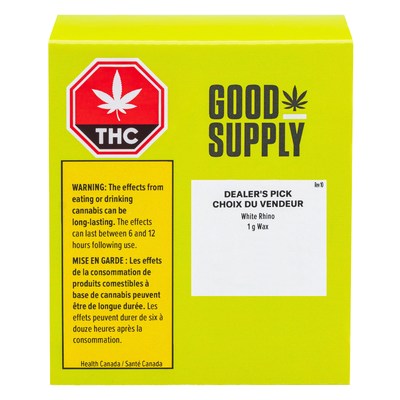Good Ol' Hash created from a blend of top Good Supply strains
White Rhino available in Dealer's Pick/Grower's Choice Wax for a limited time
Good Supply Kief available in Jean Guy and Sour Kush
Aphria Inc. (" Aphria ", " we ", or the " Company ") (TSX: APHA) (NASDAQ: APHA), a leading global cannabis-lifestyle consumer packaged goods company, today announced that it has entered the concentrates category under the Good Supply brand with the introduction of hash, wax, and kief.
Good Supply excels in high THC products across the largest categories in cannabis – flower, vapes , and oils – and is building off this momentum by expanding into concentrates with hash, wax and kief products. Good Supply's concentrates offer a range of formats, which provide multiple consumption experiences and potency levels. Each Good Supply concentrate follows an individual extraction process to unlock the potential of the cannabis plant, resulting in different terpene profiles and levels of THC.
"We are strategically expanding our portfolio by developing our flower into new formats. Concentrates is an exciting category that is still maturing in Canada and presents a great opportunity to offer variety to consumers," said Irwin D. Simon , Chief Executive Officer of Aphria. "We are proud of the quality that goes into Good Supply's hash, wax and kief, which Canadians can enjoy at a price point they expect."
Good Supply concentrates are a natural extension of the brand, delivering on quality in three unique, complex new formats that are high potency and high value.
Good Ol' Hash
As the first brand from Aphria's portfolio to launch a hash product, Good Supply's Good Ol' Hash is a high potency (35% THC 1 ) solventless concentrate, developed from a blend of Good Supply strains and available in select Canadian markets in a 2-gram format. Hash is currently the single largest format in the concentrate's category, with four out of the top five concentrates in Ontario being hash products 2 .
Good Supply Wax
Good Supply Wax is available in select markets under the Grower's Choice ( ON)/ Dealer's Pick name. Hydrocarbon extraction is used as a solvent to extract cannabinoids and terpenes from whole flower, resulting in a smooth wax texture. Grower's Choice ( ON)/ Dealer's Pick is currently produced using a single-strain input, White Rhino, and has a potency of 78% THC with aromas of citrus, berry and pine.
Good Supply Kief
Offered in two of its best-selling strains, Jean Guy and Sour Kush, Good Supply Kief is now available nationally ( except Quebec ) in 1-gram units. Consisting of terpene and cannabinoid-rich trichomes, Good Supply Kief can be used in conjunction with flower to increase potency.
For more information, visit: www.goodsupplycannabis.com
About Aphria Inc.
Aphria Inc. is a leading global cannabis-lifestyle consumer packaged goods company with operations in Canada , United States , Europe and Latin America , that is changing people's lives for the better – one person at a time – by inspiring and empowering the worldwide community to live their very best life by providing them with products that meet the needs of their mind, body and soul and invoke a sense of wellbeing. Aphria's mission is to be the trusted partner for its patients and consumers by providing them with a cultivated experience and health and wellbeing through high-quality, differentiated brands and innovative products. Headquartered in Leamington, Ontario , Aphria cultivates, processes, markets and sells medical and adult-use cannabis, cannabis-derived extracts and derivative cannabis products in Canada under the provisions of the Cannabis Act and globally pursuant to applicable international regulations. Aphria also manufactures, markets and sells alcoholic beverages in the United States.
For more information, visit: aphriainc.com
| ____________ |
| 1 *Percentage may vary based on availability and lot |
| 2 OCS Sales Data (April 2021) |
![]() View original content to download multimedia: https://www.prnewswire.com/news-releases/good-supply-expands-product-portfolio-with-the-introduction-of-hash-wax-and-kief-301280364.html
View original content to download multimedia: https://www.prnewswire.com/news-releases/good-supply-expands-product-portfolio-with-the-introduction-of-hash-wax-and-kief-301280364.html
SOURCE Aphria Inc.

![]() View original content to download multimedia: https://www.newswire.ca/en/releases/archive/April2021/29/c5872.html
View original content to download multimedia: https://www.newswire.ca/en/releases/archive/April2021/29/c5872.html




